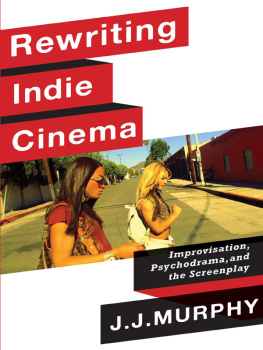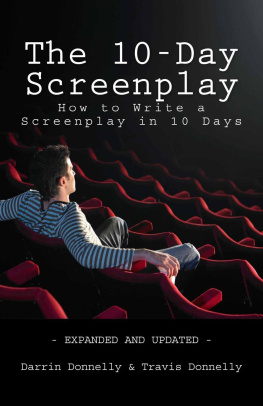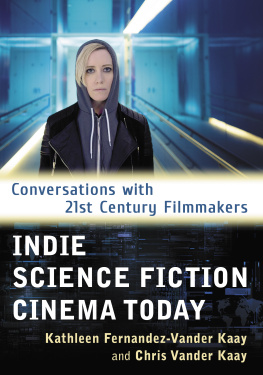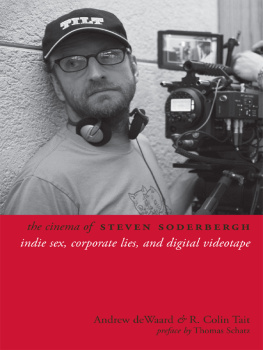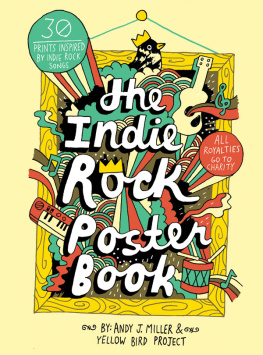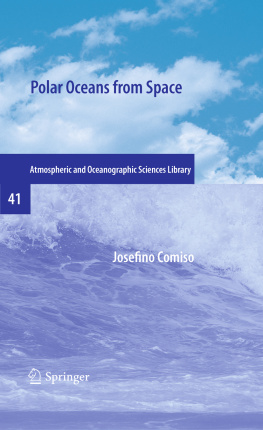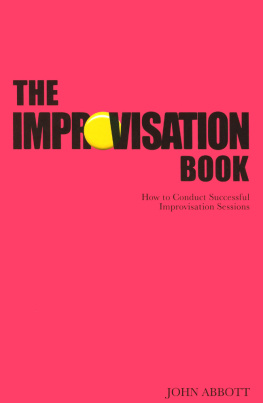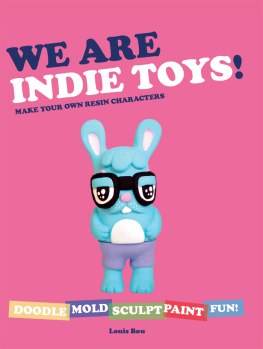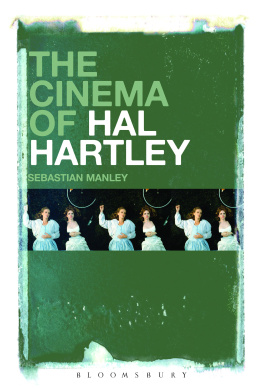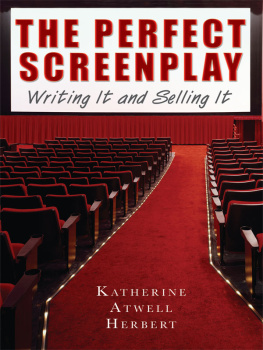Table of Contents
REWRITING INDIE CINEMA
FILM AND CULTURE SERIES
FILM AND CULTURE
A series of Columbia University Press
Edited by John Belton
For the list of titles in this series, see pages .
REWRITING INDIE CINEMA
IMPROVISATION, PSYCHODRAMA, and the SCREENPLAY
J. J. MURPHY
Columbia University Press
New York
Columbia University Press
Publishers Since 1893
New York Chichester, West Sussex
cup.columbia.edu
Copyright 2019 Columbia University Press
All rights reserved
E-ISBN 978-0-231-54959-2
Library of Congress Cataloging-in-Publication Data
Names: Murphy, J. J., 1947 author.
Title: Rewriting indie cinema : improvisation, psychodrama, and the screenplay / J. J. Murphy.
Description: New York : Columbia University Press, [2018] | Series: Film and culture | Includes bibliographical references and index.
Identifiers: LCCN 2018041901| ISBN 9780231191968 (cloth : alk. paper) | ISBN 9780231191975 (paperback : alk. paper) | ISBN 9780231549592 (e-book)
Subjects: LCSH: Independent filmsUnited StatesHistory and criticism. | Motion picture plays, AmericanHistory and criticism.
Classification: LCC PN1993.5.U6 M79 2018 | DDC 791.430973dc23
LC record available at https://lccn.loc.gov/2018041901
A Columbia University Press E-book.
CUP would be pleased to hear about your reading experience with this e-book at .
Cover design: Noah Arlow
Cover image: Tangerine (2015). Courtesy of Sean Baker
TO GEORGE AND PAMELA HAMEL AND FAMILY, WITH DEEP GRATITUDE, FOR MAKING THIS BOOK POSSIBLE.
CONTENTS
O n a very hot Friday afternoon in July of 2016, I sat with six women and two men (another woman would join us the next day) for the start of a four-day residence on psychodrama in the small town of Highland, New York. After introductions by each member of the group, the psychodramatist had us gather on the original stage that J. L. Moreno had built in 1936. Each group member was asked to discuss the psychodrama she or he would like to enact in the session. Using a sociometric technique, which involved each member placing a hand on someones shoulder and then reading the flow of energy within the group, the various participants collectively chose the person whose drama they wished to see. To my utter surprise, the group chose me, even though I was the only person who had never done psychodrama before. Through a strange series of events, my scholarly research for this book had led to this moment of finding myself in the spotlight among a group of strangers.
The genesis of this book has its roots in a keynote address that I gave at the first Screenwriting Research Network (SRN) conference in Leeds, England, which I eventually revised into an article for the Journal of Screenwriting. It was equally sparked by watching J. L. Morenos psychodramas on television as a kid in the New York City area. The psychodramas were intense sessions of group psychotherapy. I remember my mothers dismay at discovering what I was watching. Whatever age I was, she didnt think it was an appropriate program. This didnt prevent me from viewing it subsequently; I simply kept the volume down. I find it fascinating how seemingly random early experiences end up shaping the direction of peoples lives in profound ways. When I saw my first Warhol film as a college student, a light bulb went off inside my head. The same thing happened with Moreno, although it took me many years to grasp this connection more fully.
Like all films, books are a form of collaboration. Scott MacDonalds pioneering work on William Greaves was crucial to this project. Louise Archambault was an invaluable source of information and a major resource. She helped me set up interviews with Jonathan Gordon, as well as Shannon Baker and Audrey Henningham, the two principal performers in William Greavess Symbiopsychotaxiplasm: Take 2 . I also appreciate the psychodramatists who generously gave of their time to speak with me at some length: Robert Siroka, Marcia Karp, John Nolte, Jim Sacks, and Nan Nally-Seif. It was John Nolte who first encouraged me to do psychodrama if I wanted to understand it fully. Kate Merkle also shared her knowledge of psychodrama. I also interviewed several filmmakers: Sean Baker, Sam Fleischner, James Solomon, and Spencer Parsons. I am grateful to Bianca Hunter for her willingness to discuss her performance in Bad Lieutenant and to Lawrence Michael Levine for discussing The Zone. The book would not be nearly as informative without the input from these interviews. Special thanks to Sean Baker for providing the image from Tangerine for the book cover.
Thanks to my film area colleagues: Kelley Conway, Jeff Smith, Lea Jacobs, Maria Belodubrovskaya, Ben Singer, Vance Kepley, David Bordwell, and Kristin Thompson. David Bordwell was kind enough to read a very early version of the book. His astute and detailed comments led me to rethink and restructure it. He also suggested the perfect publisher. Mike King proofread and provided insightful suggestions on the manuscript. I also owe appreciation to Kelley Conway for her valuable feedback, as well as John Powers, Richard Neupert, and Jim Healy. I owe special thanks to my graduate student, Matt Connolly, who served as a research assistant on this project, transcribed many of the interviews, and checked footnotes. Erica Moulton provided critical feedback and suggestions on final revisions. Kait Fyfe assisted me in selecting and making stills for the book. Linda Lucey went beyond the call of duty to help me navigate the funding for the various grants that I received. Brandon Colvin, Amy Sloper, Erik Gunneson, Peter Sengstock, and Mary Rossa were supportive of this research project in invaluable ways.
Little did I know, when I accepted the invitation to give the keynote at the first SRN Conference, that the scholars I would subsequently meet through the organization would profoundly influence my subsequent research and thinking about the screenwriting studies. These scholars include: Ian Macdonald, Kathryn Millard, Steven Maras, Steven Price, Eva Novrup Redvall, Adam Ganz, Jill Nelmes, Alex Munt, Jule Selbo, and Paul Wells.
On a personal level, the pressures of writing a book affect a person in all kinds of ways. There is an antisocial component in having to focus ones energies so intently on the work at hand. I feel lucky that my loving partner of many years, Nancy Mladenoff, who spends long hours painting in her studio, remains so understanding.
I owe a debt of gratitude to Philip Leventhal, my editor, and John Bolton, the series editor, at Columbia University Press. I could not have nicer or more supportive editors. I am very grateful to Philip for his engagement and good advice throughout the process. My thanks also go to the production supervisors, Kat Jorge at Columbia and Ben Kolstad at Cenveo. It was a pleasure to work with such a capable team during the production phase of the book. Some of this material appeared in various forms in three articles that I wrote for the Journal of Screenwriting as well as a chapter on mumblecore I wrote for Geoff Kings edited volume, A Companion to American Indie Film





